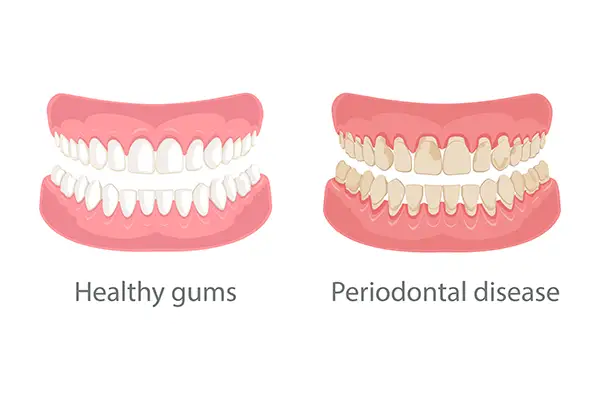Managing Gum Recession in Older Adults
Posted on 9/1/2025 by Dr. Darren Huddleston |
 As we age, our bodies naturally undergo changes. This includes our oral health. One common concern for older adults is gum recession, which is the gradual wearing away of the gums that expose the tooth's root. This can lead to sensitivity, discomfort, and even tooth loss. While gum recession can affect anyone, it is more prevalent in older adults. As we age, our bodies naturally undergo changes. This includes our oral health. One common concern for older adults is gum recession, which is the gradual wearing away of the gums that expose the tooth's root. This can lead to sensitivity, discomfort, and even tooth loss. While gum recession can affect anyone, it is more prevalent in older adults.
The good news is that gum recession can be managed and even prevented. In this article, we will discuss the causes of gum recession, its symptoms, and different treatment options available for older adults.
Causes of Gum Recession in Older Adults
Several factors can contribute to gum recession in older adults. These include:
| • |
Periodontal disease: This is the leading cause of gum recession. Periodontal disease is an infection of the gums and surrounding tissues, which can damage the gums and supporting bone. |
| • |
Receding gums: As we age, our gums naturally recede slightly. This is due to a combination of factors, including genetics, oral hygiene habits, and general wear and tear. |
| • |
Aggressive tooth brushing: Brushing your teeth too hard or using a hard-bristled toothbrush can irritate and damage the gums, leading to recession. |
| • |
Tobacco use: Smoking and chewing tobacco can significantly increase the risk of gum recession. |
| • |
Teeth grinding: Grinding your teeth can put stress on the gums and contribute to recession. |
| • |
Ill-fitting dentures: Dentures that don't fit properly can rub against the gums and cause irritation and recession. |
Symptoms of Gum Recession
The symptoms of gum recession can vary depending on the severity of the condition. Some common symptoms include:
| • |
Visible receding gums: You may notice that your teeth appear longer than usual, as the gum tissue has pulled away from the tooth root. |
| • |
Sensitivity to hot and cold: Exposed tooth roots are more sensitive to temperature changes, which can cause discomfort when eating or drinking. |
| • |
Pain when chewing: If the gum recession is severe, it can become painful to chew. |
| • |
Loose teeth: Gum recession can weaken the support for your teeth, making them loose. |
| • |
Bleeding gums: You may notice your gums bleed when you brush or floss. |
Treatment Options for Gum Recession
The treatment for gum recession will vary depending on the severity of the condition and the underlying cause. Some common treatment options include:
| • |
Scaling and root planing: This procedure removes plaque and tartar buildup from the teeth and below the gum line, which can help control periodontal disease and halt the progression of gum recession. |
| • |
Gum grafts: In cases of severe gum recession, a gum graft may be necessary to restore the gum tissue and protect the exposed tooth root. |
| • |
Antibiotics: If an infection is present, your dentist may prescribe antibiotics to help clear it up. |
| • |
Oral hygiene instruction: Proper oral hygiene habits are essential for preventing and managing gum recession. Your dentist will provide you with instructions on how to brush and floss your teeth effectively. |
| • |
Quitting smoking: If you smoke, quitting is one of the best things you can do for your gum health. |
Prevention of Gum Recession
The best way to manage gum recession is to prevent it from happening in the first place. Here are some tips:
| • |
Practice good oral hygiene: Brush your teeth twice a day with a soft-bristled toothbrush and floss daily. |
| • |
See your dentist regularly: Regular dental checkups and cleanings are essential for maintaining good oral health and preventing gum disease. |
| • |
Quit smoking: Smoking is a major risk factor for gum recession. |
| • |
Control other health conditions: Certain health conditions, such as diabetes, can increase your risk of gum disease. Be sure to manage these conditions effectively. |
Conclusion
Gum recession is a common concern for older adults, but it can be managed and prevented with proper care. By practicing good oral hygiene, seeing your dentist regularly, and making healthy lifestyle choices, you can keep your gums healthy and your smile bright.
If you are experiencing any symptoms of gum recession, it is important to see your dentist as soon as possible. Early diagnosis and treatment can help prevent further damage and preserve your oral health.
|
|